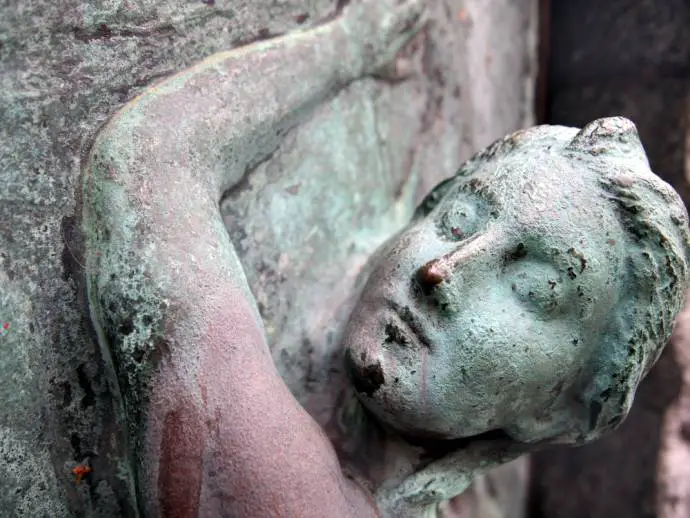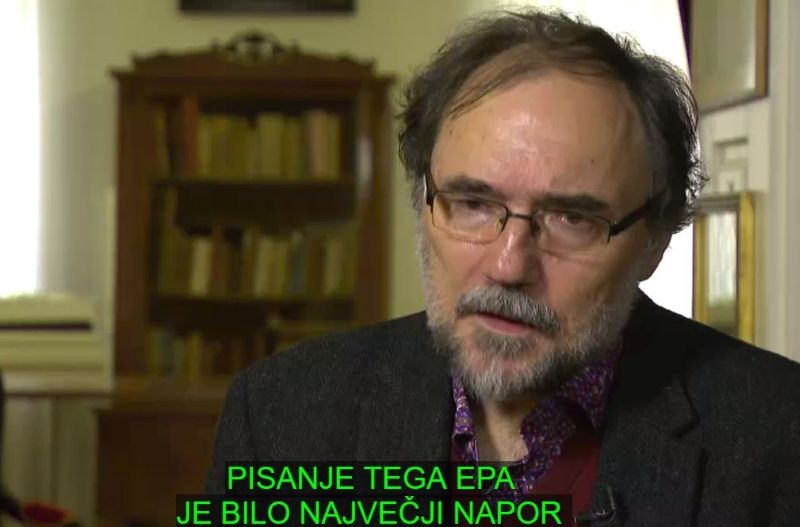STA, February 7, 2018 - Poet Boris A. Novak and ballet dancer and choreographer Janez Mejač received the top honours as Slovenia's finest artists and culture were celebrated at a high-profile ceremony on Wednesday.
Despite the festive mood, there was also a sense of bitterness as the chairman of the fund selecting the winners of two Prešeren Prizes and six Prešeren Fund Prizes, took the occasion to criticise the society's attitude to art, something that has become a tradition at the event on the eve of Culture Day.
As one of the two Prešeren laureates Novak was praised for having played a "significant role in the Slovenian cultural landscape for 40 years as a poet, playwright, translator, author, socially-engaged intellectual, literary scholar and university professor".
Boris A. Novak, talking about his epic. Screenshot
According to the jury, Novak used all of his skills and poet's instruments in his "magnificent" epic poem Vrata nepovrata (The Door of No Return), which combines epic narrative and lyric poetry, free and classical verse and poetry forms into a "grand fresco of Slovenia's 20th century".
In place of his acceptance speech Novak read bits from his poem, which he said was "the best way to express my gratitude". "As an epic poet I'm sadistic as far as the audience is concerned and I like to read for hours," he joked, but showed his mercy.
Mejač, recognised as a danseur noble, was honoured with the lifetime achievement award for making a profound mark on 20th century Slovenian ballet through more than 80 solo roles, as well as as director, choreographer and teacher.
Sadly there's not much of Mejač online.
The award panel described his dance in terms "the beauty of movement that comes from the sensual depths of the soul through selfless effort, hard work, discipline and passion to be able express itself... in subtle metaphysics of ballet art".
Mejač was so "overwhelmed by emotion" that despite being more than 80 it "may have been easier for me to dance than to speak to you. You know, the dancer's tool is his body and dance is like life, it never ends."
Mejač regretted the neglect shown to this form of art, noting that out of more than 900 Prešeren Prizes and Prešeren Fund Prizes only a score went to ballet artists.
Six Prešeren Fund Prizes for achievements in the past two years went to filmmaker Marko Brdar, actor Matej Puc, performer Simona Semenič, ballet dancer Valentina Turcu, photographer Boris Gaberščik and intermedia artist Maja Smrekar.
The prizes are named after Romantic poet France Prešeren (1800-1849). The date of his birth on 8 February was designated as Culture Day in 1945 and has been observed as a work-free day since 1991.
Prešeren's poetry at tonight's ceremony was interpreted by several Slovenian rappers and other musicians and through dance and was tinged with signs of protest.
In his address, the chairman of the Prešeren Fund Vinko Möderndorfer cited Scandal in the St. Florian Valley, a 1907 farce in which writer Ivan Cankar (1876-1918) described his fellow countrymen's disdainful attitude to art.
"I don't think that anything has changed since then; in many aspects it's rather worse," Möderndorfer said, adding that today's society valued salesmen higher than creators.
"Art is the only genuine, non-ideological opposition to the nonsense of power... This is why it's continuously bothering people in power and it may be this is why all the governments want to push art into the sphere of pleasant entertainment, voluntary reflection, happy hours after a day of precarious work.
"They want to drown the power of art in general commercialisation where ratings and profit matter more than quality," said Möderndorfer, criticising in particular the government's attitude to non-institutional artists.
The prizes have been conferred annually since 1947 and have been named after the poet since 1955. They come with a prize money of EUR 21,000 for the Prešeren Prize and EUR 7,000 for Prešeren Fund Prize.







